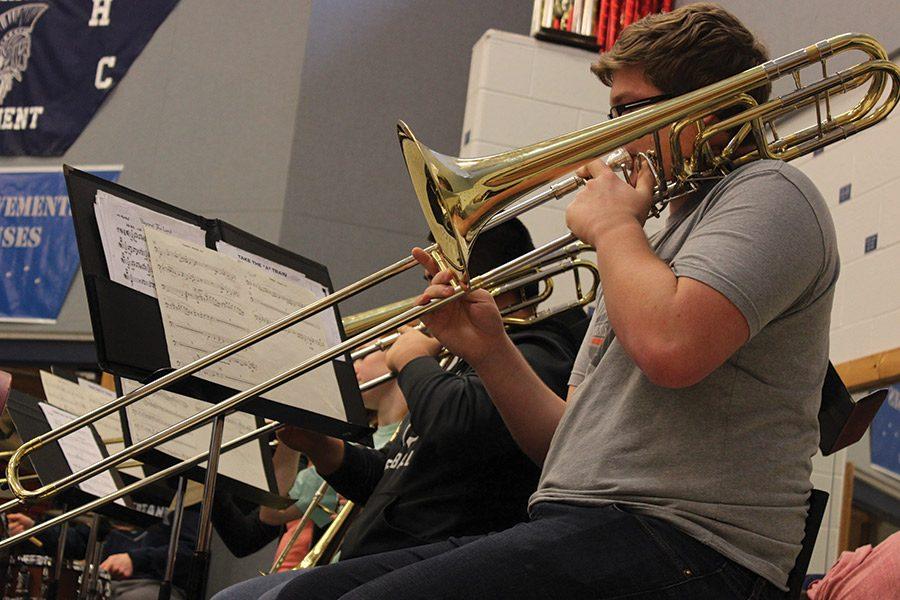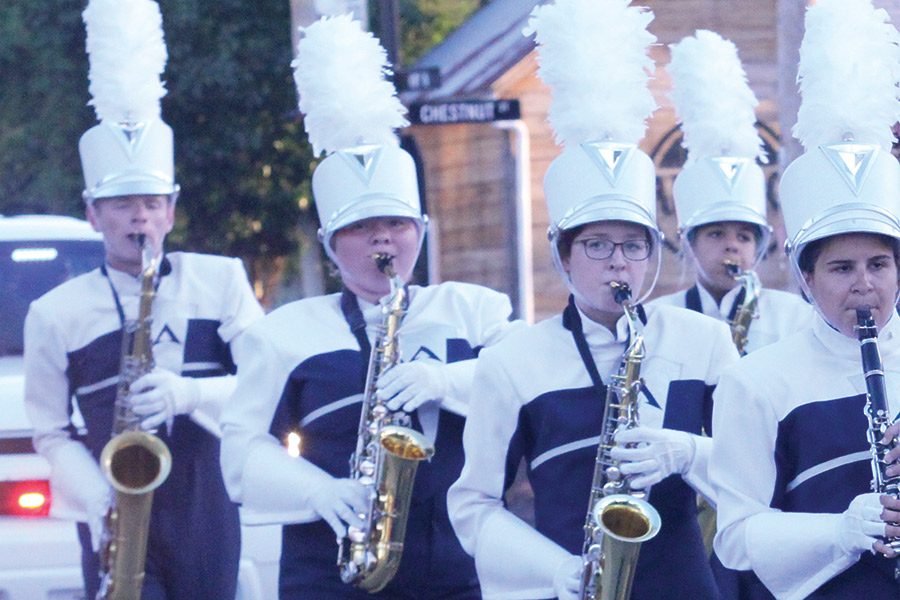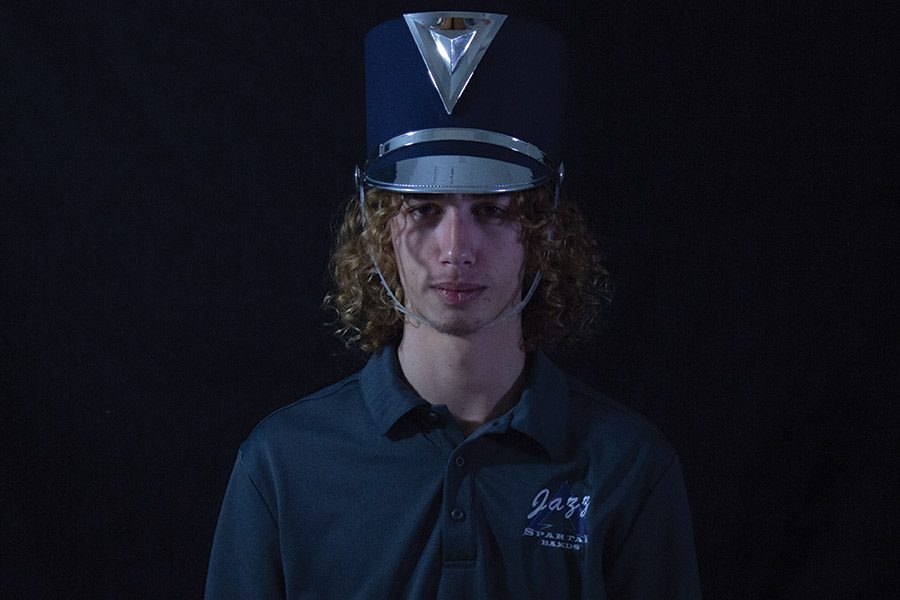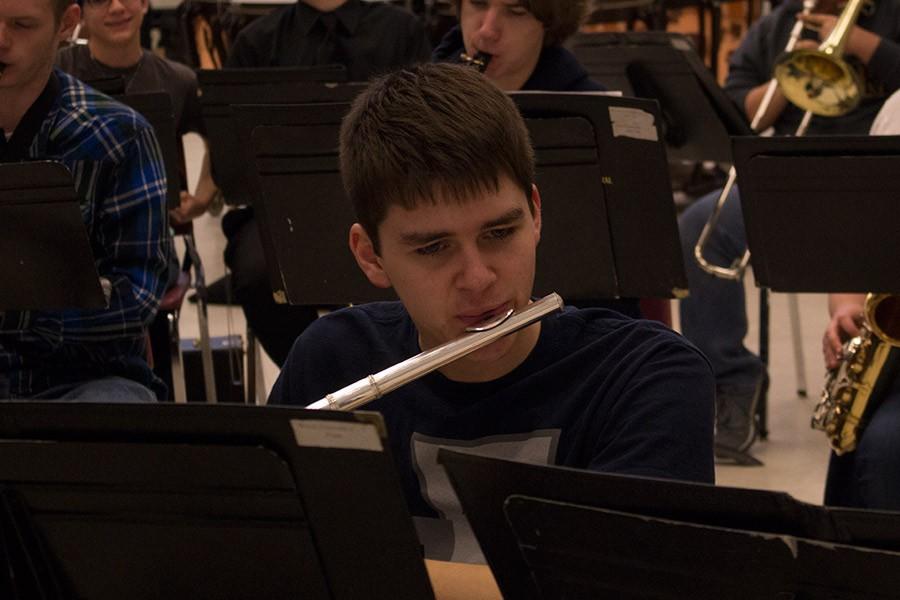Your donation will support the student journalists of Francis Howell Central High School. Your contribution will allow us to purchase equipment and cover our annual website hosting costs. FHCToday.com and our subsequent publications are dedicated to the students by the students. We hope you consider donating to allow us to continue our mission of a connected and well-informed student body.
Future of music
May 17, 2016
Taking a look at the futures of high school students, some have chosen to pursue what they hold near and dear to them – music.
Alan Meister
Every day during the late summer and fall, the marching band students trek their way over to the fields, instruments and equipment in hand, ready for a three hour practice. However, once they get to the field, something incredible happens as each student hits their set, ready to plow through another ‘top of the show.’ Senior Alan Meister has grown to call these long hours of practice comforting and just like home, however the year has come to an end, and graduation is seconds away. For many people, high school marching band is the end, for some, it’s college marching band; but for Meister, the season on a DCI corps has just begun.
“DCI stands for Drum Corps International. So there’s the marching band at our school, we practice like two and a half, three hours every day after school, and DCI does that for 12 hours a day all summer long. So, in short they’re really good marching bands that compete all summer long. Kind of the NFL of marching band, more or less, but instead of them paying you, you’re paying them,” Meister said.
DCI is a well-known branch of marching band that members of the FHC Spartan Regiment know and love. Oftentimes during band camp lunch breaks, students will go and discuss their favorite corps of the summer and their favorite shows, and maybe even travel to see DCI competitions in their free time. The decision for Meister was an easy one to join DCI after seeing his favorite corps perform.
“I guess what’s really inspired me is the thought of being in The Cavaliers which is a DCI corps that I really would like to be in and be a part of. So just thinking about how awesome it would be under the finals stadium lights playing the last note of a show is just really, really inspiring,” Meister said.
Meister plays the baritone in the FHC Spartan Regiment, trombone in the Spartan Wind Ensemble, and bass trombone in the Spartan Jazz Ensemble, however his involvement with music began way before the middle school instrument try-out day.
“Well, when I was really young, my parents told me that I was going to do music because they did music. So, they started me on piano and told me I had to do that for 2 years, then I moved to drums, and then I moved to trombone,” Meister said. “I’ve had involvement with music for probably ten or eleven years; a long, long time.”
Unlike the Spartan Regiment, where anyone who plays an instrument in the school programs is welcome to join, and those who don’t are welcome to try out for color guard, DCI corps have a long, grueling tryout time. Students will travel hundreds of miles for a weekend just to try out for a corps, and the cutoffs are tough.
“The tryout process is long. It starts in November and you go and go for a weekend; you get there Friday and you’re auditioning till Sunday at 1,” Meister said. “The entire time they’re grading you on musical stuff all the way down to your social abilities. They’re grading how well you mesh with the other people, and then of course there’s the stuff like music, visual, and all that stuff.”
Not only is the tryout process time consuming, but the prep time can be extensive and a little stressful. Meister practices long before tryouts to make sure his performances go well, and even so that he may have a leg up on the competition.
“I print out the music the second that they send it out because you have to prepare music beforehand, and then like after practicing that into the ground, I also go and watch some of their videos and see if I can decipher any of their marching technique from the video and then try to emanate that so that I’m not going in completely blind,” Meister said.
DCI is an extremely time consuming and expensive activity, however Meister deems it well worth the time and money.
“From my side, if you make the corps, then you’ve already paid for 3 camps up to that point, each camp is $150, and then summer is $3000. It’s a pretty expensive activity and the time commitment is massive because you’re basically gone from May 28 to Aug 12,” Meister said.
Meister leaves June 10 to pursue his passions for the summer, however he will always be home the moment he steps foot on a football field.
Mariah Skelly
Oftentimes when people think of therapy, they think of the classical Freudian scenario with someone sitting on the couch talking through their problems while the psychologist scribbles away at their paper, with the intermittent question, ‘so how does that make you feel?’ This, however is not the case for senior Mariah Skelly. In Skelly’s mind, therapy is filled with melodies, songwriting, and a catharsis that can only be expressed through music. Skelly has chosen to pursue a path in music therapy to help people work through their problems with the aid of instruments and song in hopes of a brighter future.
“Music therapy is basically therapy through music. The big thing is helping people get better through music, so whether that be someone who can’t speak and they can only use sign language, music is another way for them to express themselves, you can play an instrument, some people will take drums and make patterns that mean different things and they’ll bang on the drums. In an overview it’s really helping people get better through music. I could talk about music therapy all day, it’s just a really cool field,” Skelly said.
Skelly planned to go into music from a young age, but her parents pushed her into something they deemed a little ‘more reasonable.’ Skelly absolutely adores the field this has allowed her to discover and is extremely excited for the future to come. She’s had involvement with music since day one and is keeping true to herself in her career.
“So my mom said I’ve been singing before I could talk, like I would babble-sing nursery rhymes, and so I’ve basically been doing music my whole life. I did piano when I was younger, I was in choir, I joined band, and so music just has always been this constant thing in my life and so I wasn’t really ready to let that go yet, and so I was like ‘well what can I do with music that won’t let that fade into the background of my life?’” Skelly said. “I was like ‘I want to go into music, but what will actually pay me and is steady?’ so I was like oh music therapy – that sounds really cool, you get to help people and you also get to make music.”
Not only have her parents helped her discover this field, but another close family member really impacted her choice to become a music therapist.
“Something that’s really pushed me in this is that my grandma had an aneurism when I was in seventh grade, and her memory isn’t still all the way back, but she can still remember some of the piano songs that she used to learn as a kid, and I was like ‘well if that can help her, I can help other people too,’” Skelly said.
Skelly has researched many schools and is firm in her final decision on where to go.
“I’m going to go to Drury University because obviously the financial standpoint where I won’t be in debt my entire life, but like also they have a music therapy clinic on their campus, and you get to sit in on classes as a freshman and observe actual patients that use it,” Skelly said. “At Drury they have a teen group that’s getting over substance abuse and they play like rock band and they write their own songs with them to help them express themselves, or like I could work with little kids with autism or little kids with developmental disabilities to help them keep going. I can help with really old people that are losing their memories and help them keep them.”
Skelly has had a passion to help people for as long as she remember. Her passion for music and her passion for volunteering mesh harmoniously in the music therapy career and Skelly could not find a better fit for herself.
“Really, what keeps me going is the fact that I’ve always wanted to help people. I’ve always had that drive, I’ve always loved volunteering, and so I always want to help make a difference and a way that I can do that is make a difference in other people’s lives through the music,” Skelly said. “To the people that are going to say that this is a dead end career and you’re not going to make any money, this is a growing field. There is more music therapist jobs than there are music therapists, I’m always going to be having a job, unlike some people where their spots are going to be filled very soon. I’ll always have a job and always be able to grow and move on in my career.”
Skelly is prepared and ready to start her career as a music therapist and help people grow and flourish into something better, or help repair their broken pieces of themselves for a better future.
Geoffrey Tibbles
With senior year ending, many students are stressed about what to do with their life, what they’re going to do in college, what career path they’re setting themselves up for, and how they’re going to get there. For senior Geoffrey Tibbles, there’s no better answer than choosing to go into music education and pursuing a career as a high school band director. From playing French horn in the FHC Spartan ensembles to conducting the FHC Spartan Regiment, Tibbles has found his heart in the place where it truly fits – in music.
“Really I didn’t know what I was going to do with my life, and then one day, during junior year I woke up and was like ‘man every day sucks until I get to band class, and once I leave band class, every day sucks, until I get to marching band, and once I leave marching band, every day sucks.’ So I figured, why not make band what I do all the time? So, that’s why I decided to go into music education,” Tibbles said.
Tibbles finds music to be the thing that really truly makes him happiest in the best way. Music is a relaxing thing for him, and the environment where music is made is where he has found that he can truly be himself.
“I think it’s like I just want to have fun. Like I said, every day if I wasn’t around band then I wasn’t having fun. I know that I have fun being in marching band, so like I was having fun being drum major, I’m sure I’d have fun being a director, I’m sure I’d have fun doing what Messerli does conducting our wind ensemble, it’s just a thing of fun,” Tibbles said.
Tibbles has chosen to study at Mizzou to pursue this career. He had formerly decided on K State due to a marching camp he went to for drum majors there, but sometimes life has a way of switching people’s directions.
“I was torn between K State and Mizzou, and it turns out that I’m going to go to Mizzou, and it’s truly because of money. Like both are good music schools, it’s just Mizzou is going to cost less,” Tibbles said.
Regardless of what life ends up throwing at him, Tibbles is not going to let anything get in the way of his passions; he has a game plan for everything he has ahead of him.
“Well, okay everyone says it’s a dead-end major, and I just think that’s garbage because if I don’t get a job at Francis Howell Central where they’ve got a good band program, then I’ll go to an inner city school and get a job there and not make as much money, but like establish myself. It’s not a dead-end major, you know what I mean? I’ll have a way to get a job, and then build myself up on top of that – I’m not worried about that,” Tibbles said.
Tibbles attributes his passion to the main inspirations he has gained from his years at Francis Howell Central. His desire to become a band director in high school comes from none other than his own band directors Mr. Nathan Griffin and Mr. Andy Messerli.
“[My inspirations] would be good ol’ G Dog and The Mezz, shout out to those guys for being there. They’re the best, I love them,” Tibbles said.
When asked about the economic struggles that may come with a music major, Tibbles wasn’t even phased. His perspective was unabashed and different than that of many.
“Other people say, ‘y’know, you’re not going to make much money, you should be a doctor or a lawyer’ my argument is, I don’t have much money now, why do I need very much money in the future? If I make as much as my dad, I’ll be good, and I will make as much as my dad,” Tibbles said.
Tibbles butted heads with his parents originally when announcing to pursue a typically frowned upon major, but once they saw where his passions lie, he won them over.
“I was not [supported by my parents] at first, but I am definitely now. I definitely proved my point and both my parents are with me. My dad was real mad when I told him I was going into music ed. because I’ve always been the super smart kid, supposed to be a doctor, so ‘waste of my life,’” Tibbles said.
Tibbles has already begun his path to become a high school band director, however he realizes he has more ahead of him. He feels prepared to take on college and is excited for the career after.
“I picked up an instrument, then I got okay at that instrument, and then I started taking lessons on that instrument, and then I became drum major, and that was the main, big turning point, that showed me conducting and being in front of the whole band and everything, and just kind of put it into perspective, like I could do it,” Tibbles said. “Next step is go to college and I’m going to college, and I’m going to do well at college because I do well here and I’ll do well there, it’s not a question, and then I’m going to just get the job. It’ll be dope.”
Jordan Handley
Senior Jordan Handley chooses a career as a band director.
Students are constantly having the “future questions” shoved down their throats. The words “where do you want to school?” “what do you want to major in?” and “what career do you want to pursue?” are constantly ringing in the ears of high school kids. Senior Jordan Handley deflects these questions with a single word. Music.
Handley is going to go to school for music and pursuing the career of a band director.
“I’m going into secondary education, so like high school band director, music stuff,” Handley said.
Often students find themselves at a crossroads, knowing possibly their major but not a career choice. When Handley was faced with this, he looked to his experience to choose.
“I enjoy going to band every day and I’m in three band classes right now, concert band, symphonic band, and wind ensemble, and a lot of people are like ‘that really sucks’ but I actually really enjoy being able to interact with all the different musicians, and listen to the band classes, and just really appreciate music.” Handley said.
Whenever choosing a career, people often model their choices after their inspiration, or what they enjoy. Handley found security in both.
“Actually, I’m kind of modeling after Mr. Griffin and Mr. Messerli. Ever since I got into band over at Saeger Middle School with Mrs. Crepps, I was like ‘That is what I want to do,’” Handley said. “I know when I started playing my flute, the first year kind of sucked. I wanted to quit and Mrs. Crepps was like, ‘No, you’re really good, keep doing it!’ and then ever since she kind of gave me that push it’s been really helpful for me to keep going, with the thought of ‘I’m good at this, I need to keep going.’”
When choosing a major, people throw their opinions left and right, and once you announce an uncommon field like music, the critics get harsher. People may say that musicians won’t get any money, or will be unhappy with their choice. Music seems like a dead end career to many, but Handley is looking towards the light at the end of the tunnel.
“It’s what makes me happy, actually, it sounds kind of cliche, but if you do what you love, I don’t think you will ever work a day in your life – also really cliche, but it’s true,” Handley said.
Luckily, his parents are supportive of his decision, and even a little enthusiastic.
“My dad definitely supports me, ever since I got involved with band he’s like, ‘I’m going to all your concerts and going to all the fundraisers!’ and he’s really involved,” Handley said. “My mom is kind of supportive but not as much. My dad’s really in with the band boosters and that extra stuff, whatever he can do to help is really fantastic.”
Handley has decided to pursue a career in music at Lindenwood University, a college close by.
“I’m planning to go to Lindenwood, mostly because of money. It sounds kind of awful but I’m supposed to get either a free ride or really close to a free ride, and then the location kind of helps too, being close to home and being familiar with everything around,” Handley said.
Being able to be comfortable in school and your choices is always important, and whenever school is willing to give that opportunity, the aid is always welcome.
After choosing a major, some students even decide to take the extra steps down that path. People may decide to become interns, shadow people living their careers, or get in touch with future colleagues. Handley has taken full advantage of this and spoken to the band directors here at Francis Howell Central.
“I’m kind of late on a lot of the stuff but talking to Mr. Messerli and Mr. Griffin about band careers and what to do and what not, they recommended lessons and auditioning for Metro 8, and kind of really taking those extra steps,” Handley said. “I kind of regret not getting into it earlier, but I’m glad I’m getting into it now because I guess better late than never.”




